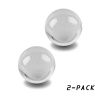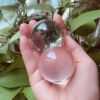DSJUGGLING Small Size of Clear Acrylic Contact Juggling Ball for Beginners, Kids & Mini Transparent Practice Juggling Ball for Small Hands
1.Transparent Acrylic Contact Juggling Ball for Kids or Beginners, or the people with small hands.
2.These balls are made using optical grade acrylic material which is free of internal distortions, seamless, one piece and highly polished by handmade, So there will be slight errors in size.
3.Great for multi-ball contact juggling or by people with small hands.
4.Universal sizes for Juggling beginners, Two-ball, Three-ball and multi-ball, better and more choices for you.
5.Transparent Practice Juggling Ball Kits Great for small hands to Manage Triangle of 3 or Pyramid of 4 or Multiple Balls Contact Juggling
Details:
Dawson Juggling - To Provide You with better Juggling Products
Our storyHow we got our start?
To make a good product is to inject the heart into it, to think and act like a user.
What makes our product unique?
In order to make a good product, we need to understand that a product can be used and consumed by a user to meet their needs. From this we know that the core of the product is the user. the needs are met not by a single user, but by a type of user. Therefore, a good product must start from the user.
Why we love what we do?
To make a good product, the first thing is to use your own product anytime and anywhere, go to the front line of the market to interview users, pay attention to user feedback, always grasp the user experience, and understand user needs.
Choose your Acrylic Contact Juggling balls from DSJUGGLING!
Clear acrylic contact juggling ball What does Contact Juggling means?Contact juggling is a style of juggling which uses balance and precision to move the objects being juggled, in contrast to "toss" juggling in which a juggler throws the objects into the air and catches them rapidly. A good example of this is Jareth the Goblin King's manipulation of glass orbs in the movie Labyrinth. | Glitter UV acrylic contact juggling ball Why should you learn contact juggling?Contact juggling is an extremely rewarding activity, maybe you’ve already practiced contact juggling at some point in your life. If you’ve ever tried to bounce an apple off your biceps, or balance a soccer ball on your back, you’ve already performed this unique art. | Glow in Dark acrylic contact juggling ballHow to choose Contact Juggling Balls?There are two different types of contact balls. The first kind is a stage ball, which is a squishy, light ball. The second kind is an acrylic ball, which are the clear balls that you see more often. Acrylic balls look way cooler, but are a bit heavier. I recommend practicing with a squishy ball for awhile, as they are much bouncier and won’t scuff when dropped. Acrylic balls will scuff if dropped enough times. | Fushigi Clear acrylic contact juggling ball How to choose the suitable juggling ball size for beginner?The ideal choice to buy can vary person to person. The size and the weight of contact juggling balls are the main variables that will determine the best fit for you. The classic ball is 75 mm, the most popular size of contact juggling ball. It has some heft to it, and is very sturdy. |
| 32mm Mini Clear Acrylic Contact Juggling Ball Set | 38mm Mini Clear Acrylic Contact Juggling Ball Set | 45mm Clear Acrylic Contact Juggling Ball Set | 50mm Clear Acrylic Contact Juggling Ball Set | 60mm Clear Acrylic Contact Juggling Ball Set | |
|---|---|---|---|---|---|
| Size | 32mm | 38mm | 45mm | 50mm | 60mm |
| Packing | 3-Pack | 4-Pack | 2-Pack | 4-Pack | 2-Pack |
| Clear Acrylic Contact Juggling Ball - 75mm (Appx. 3 inch) | Aqua Blue Acrylic Contact Juggling Ball - 76mm (Appx. 3 inch) | Ruby Red Acrylic Contact Juggling Ball - 76mm (Appx. 3 inch) | Glowing In the Dark Acrylic Contact Juggling Ball - 76mm (Appx. 3 inch) | Clear UV Acrylic Contact Juggling Ball - 76mm (Appx. 3 inch) | |
|---|---|---|---|---|---|
| Color | Transparent | Aqua Blue | Ruby Red | Glow in the Dark | Clear UV |
How to Start your Contact Juggling?
Contact Juggling is a style of single & multiple ball manipulation also called Dynamic Manipulation & Sphere play, be able to roll, spin, toss and pass the ball back and forth, looping and bobbing it over the fingertips, palms, the tops of the hands, arms and other part of body in a graceful dance.
1. The Cradle
Hold your favored hand out, palm down with fingers extended and touching. Dip the straightened middle finger down slightly to make a cradle for the ball. Place and leave the ball on top of the fingers near the second knuckles of the first, middle and ring fingers. Keep it there for several minutes at a time to get used to it. Move your hand around, up and down as the ball is cradled on top of it, adjusting for inertia. Find the cradle on the tops of both your hands and become very accustomed to the ball being there.
This is intrinsic to DSJUGGLING contact juggling.
2. Palm to Cradle Over the Edge (transfer)
Hold the ball in your open palm, set on the upper, meaty part between the third and second knuckles.
Now, keeping the fingers together and straight (but not tense), give the ball a very slight lift up and pivot your open hand inwards, still underneath the ball so that it rolls over the outer edge of your index finger and lands in the cradle position on the top of your hand. Hold it a few moments.
Now rotate it back to your palm with the opposite pivoting motion, dropping the plane of your hand back down if you need to. Practice until the ball moves as little as possible while your hand moves under it.
Eventually there will be "sweet spots" where you instinctively feel it and perform the move effortlessly.
3. Palm to Cradle Over the Tips (transfer)
Set the ball in the open palm as in step 2, the ball will roll over the fingertips.
Hold the ball in your open palm with the fingers together and gesturing towards ten o'clock (left) or two o'clock (right), depending on which hand you're starting with (it should look like you’re about to shrug with one arm). Then, using your elbow for a counterbalance (get your upper arm working, too), steadily swing your open palm in towards you with a windshield-wiper, arching kind of motion and let the ball roll over the tips of the fingers (just between the first and middle fingers) and on to the cradle position (top of the hand). Once the ball comes to rest on the cradle, pivot/swing your arm in the same arc back to the starting position and allow the ball to pass back over the fingertips to the palm. The ball should ultimately go over without the fingers being spread too far apart, you can also try learning this transfer with the ball first cradled in front of you and arc it out to the palm.
4.The Butterfly
This is the previous palm-to-cradle-fingertips transfer done back and forth rhythmically so that the ball travels in a fluid figure-eight or windshield wiper motion as it glides to-and-fro.
The only difference is that your elbow should be free to move around a lot more to support a fluid motion. To get a well-rounded figure-eight, lift the ball in a small, inward curve from your palm as the ball passes over it back to the cradle. Start off slowly and deliberately so you can get used to the move and watch it. The butterfly looks its best, though, when done snug and sleek. Once you've really got it, try reversing the direction of the figure-eight.
On the outward motion of the butterfly (when the ball rolls on to the palm) be sure not to cup or grasp the ball before you roll it back over to the cradle. Even when in the palm, the ball should be visible.Mastery of the butterfly leads to more flashy, intermediate moves such as the top to top butterfly pass.
How to choosing the correct size contact juggling ball?
When choosing the correct size contact juggling ball, you have to consider what you will be doing with the ball. Larger balls are good for when you are manipulating one ball at a time.
Clear and colored acrylic balls made in small sizes (32mm, 38m, 45mm, 55mm, 60mm, 65mm, 70mm) are mostly used for multi-ball contact juggling or by people with small hands. Clear and colored acrylic balls in larger sizes (75/76mm, 80mm, 90mm, 95mm, 100mm, 105mm, 110mm, 120mm) are for single- hand manipulation.
The size will be chosen based on the number of balls being manipulated also, but in general, the more balls, the smaller the size.
DSJUGGLING store has contact juggling balls with variety of sizes that are good quality. You will also get the excellent service.


